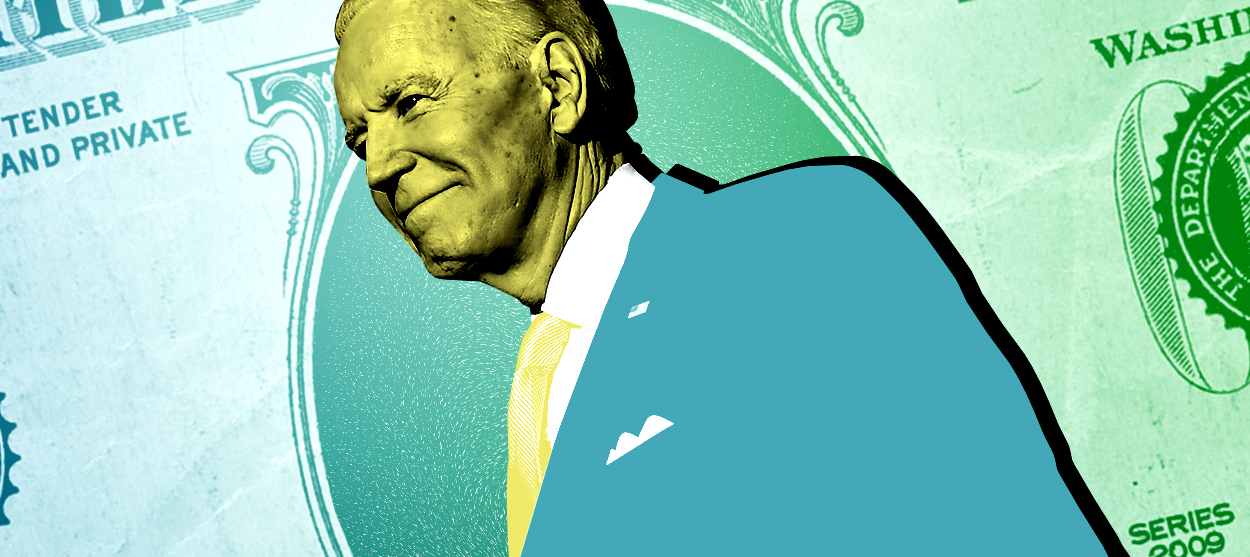Wall Street pines for President Biden
Turns out investors don't fear a Biden presidency — they fear more Trump


A free daily email with the biggest news stories of the day – and the best features from TheWeek.com
You are now subscribed
Your newsletter sign-up was successful
Remember #BatTrump? Back when Donald Trump was running for the Republican presidential nomination, he visited the 2015 Iowa State fair, landing in the Trumpcopter and then offering rides to children. One of the kiddies, a 9-year-old boy, asked the businessman, "Are you Batman?" To which candidate Trump replied, "I am Batman." Social media took notice.
But which Batman? There are many different versions across comics, television, and film. Well, now we have an answer. In the 2012 film The Dark Knight Rises, Batman rescues Gotham City from the populist supervillain Bane, who raids the Gotham Stock Exchange and encourages the ransacking of the city's wealthiest neighborhood. Trump thinks America is in similar danger of hyper-egalitarian anarchy. And only a second term can save the day. As the president said at the July 4 "Salute to America" event on the South Lawn, "We are now in the process of defeating the radical left, the Marxists, the anarchists, the agitators, the looters, and people who, in many instances, have absolutely no clue what they are doing."
If there's one group who should be especially worried, it is Wall Street. Generally, bankers and investors do not make out too well when the radical leftists and looting Marxists gain power. But much of Wall Street does not seem to see Trump as its superhero savior. The day after that White House speech, Goldman Sachs put out a research note titled "American Exceptionalism," an analysis which quickly made clear that America has been exceptionally incompetent at dealing with the pandemic and subsequent economic stoppage. It's not hard to interpret that as inherent criticism of the Trump administration.
The Week
Escape your echo chamber. Get the facts behind the news, plus analysis from multiple perspectives.

Sign up for The Week's Free Newsletters
From our morning news briefing to a weekly Good News Newsletter, get the best of The Week delivered directly to your inbox.
From our morning news briefing to a weekly Good News Newsletter, get the best of The Week delivered directly to your inbox.
After announcing that the bank was slashing its U.S. growth forecast for the third quarter to an annualized 25 percent from 33 percent, Goldman economist Jan Hatzius snarked, "Outside the U.S., the cyclical news is generally positive. We are very optimistic in Europe, where the new infection numbers remain low — the spike in confirmed cases in Germany last month has proven temporary — and the high-frequency economic indicators are showing a robust rebound." Optimistic in Europe, but not America.
JPMorgan was not nearly as snarkily subtle in its Monday morning strategy note to clients: "The consensus view is that a Democrat victory in November will be a negative for equities. However, we see this outcome as neutral to slight positive." So despite the Trump campaign suggesting a Biden presidency would be too weak to fend off the anarcho-communists — indeed, Trump says the former vice president would be a "helpless puppet of the radical left" — America's largest bank is pretty okay about it. The stock market, Trump's favorite economic indicator, would be just fine if Trump heads back to Mar-a-Lago in January, according to the analysts. Indeed, even as Biden has opened up a massive lead in the polls, prediction markets, and forecasting models, stocks have continued to rebound from their coronavirus collapse.
Now it should be noted that JPMorgan is making a big assumption: A President Joe Biden would not be a stooge of the radicals. Or even of the most lefty progressives or Bernie Sanders superfans. The bank thinks Biden would be careful about pushing policies that risk hurting economic growth — such as totally repealing the Trump business tax cuts — during a time of economic weakness and uncertainty.
From the note: "History suggests that challengers to an incumbent typically campaign at an extreme only to converge to the center post-election." Also a potential plus: more emphasis on infrastructure spending ("... could accomplish multiple priorities starting with employment, incentivizing use of alternative energy and green technologies, and modernizing public transportation, power and communication systems") and less on tariff-raising. Also less chaos, which the bank gently phrased as "a more diplomatic approach to domestic / foreign policy" than Trump, an easy hurdle to clear.
A free daily email with the biggest news stories of the day – and the best features from TheWeek.com
Maybe JPMorgan is making a bad assumption here. Maybe the Biden presidency will be a tsunami of wealth taxes, business regulation, and social spending that will drown the bull market and send investors fleeing. But what choice is Trump giving Wall Street when he is unable to articulate a second-term agenda beyond creating a statue garden of American heroes? Not much of one, apparently.
Want more essential commentary and analysis like this delivered straight to your inbox? Sign up for The Week's "Today's best articles" newsletter here.
James Pethokoukis is the DeWitt Wallace Fellow at the American Enterprise Institute where he runs the AEIdeas blog. He has also written for The New York Times, National Review, Commentary, The Weekly Standard, and other places.
-
 Will increasing tensions with Iran boil over into war?
Will increasing tensions with Iran boil over into war?Today’s Big Question President Donald Trump has recently been threatening the country
-
 Corruption: The spy sheikh and the president
Corruption: The spy sheikh and the presidentFeature Trump is at the center of another scandal
-
 Putin’s shadow war
Putin’s shadow warFeature The Kremlin is waging a campaign of sabotage and subversion against Ukraine’s allies in the West
-
 The ‘mad king’: has Trump finally lost it?
The ‘mad king’: has Trump finally lost it?Talking Point Rambling speeches, wind turbine obsession, and an ‘unhinged’ letter to Norway’s prime minister have caused concern whether the rest of his term is ‘sustainable’
-
 The billionaires’ wealth tax: a catastrophe for California?
The billionaires’ wealth tax: a catastrophe for California?Talking Point Peter Thiel and Larry Page preparing to change state residency
-
 Bari Weiss’ ‘60 Minutes’ scandal is about more than one report
Bari Weiss’ ‘60 Minutes’ scandal is about more than one reportIN THE SPOTLIGHT By blocking an approved segment on a controversial prison holding US deportees in El Salvador, the editor-in-chief of CBS News has become the main story
-
 Memo signals Trump review of 233k refugees
Memo signals Trump review of 233k refugeesSpeed Read The memo also ordered all green card applications for the refugees to be halted
-
 Has Zohran Mamdani shown the Democrats how to win again?
Has Zohran Mamdani shown the Democrats how to win again?Today’s Big Question New York City mayoral election touted as victory for left-wing populists but moderate centrist wins elsewhere present more complex path for Democratic Party
-
 Millions turn out for anti-Trump ‘No Kings’ rallies
Millions turn out for anti-Trump ‘No Kings’ ralliesSpeed Read An estimated 7 million people participated, 2 million more than at the first ‘No Kings’ protest in June
-
 Democrats: Harris and Biden’s blame game
Democrats: Harris and Biden’s blame gameFeature Kamala Harris’ new memoir reveals frustrations over Biden’s reelection bid and her time as vice president
-
 ‘We must empower young athletes with the knowledge to stay safe’
‘We must empower young athletes with the knowledge to stay safe’Instant Opinion Opinion, comment and editorials of the day
